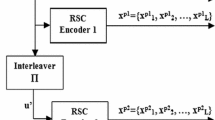Abstract
A new soft decision maximum-likelihood decoding algorithm, which generates the minimum set of candidate codewords by efficiently applying the algebraic decoder is proposed. As a result, the decoding complexity is reduced without degradation of performance. The new algorithm is tested and verified by simulation results.
Similar content being viewed by others
References
P.G. Babalis, P.T. Trakadas and C.N. Capsalis, “A Maximum Likelihood Decoding Algorithm for Wireless Channels”, Wireless Personal Communications, Vol. 23, No. 2, pp. 283–295, 2002.
T. Kaneko, T. Nishijima, H. Inazumi and S. Hirasawa, “An Efficient Maximum-Likelihood-Decoding Algorithm for Linear Block Codes with Algebraic Decoder”, IEEE Transactions on Information Theory, Vol. 40, No. 2, pp. 320–327, 1994.
H. Tanaka and K. Kakigahara, “Simplified Correlation Decoding by Selecting Possible Codewords Using Erasure Information”, IEEE Transactions on Information Theory, Vol. IT-29, No. 5, pp. 743–748, 1983.
Gazelle and J. Snyders, “Reliability-Based Code-Search Algorithms for Maximum-Likelihood Decoding of Block Codes”, IEEE Transactions on Information Theory, Vol. 43, No. 1, pp. 239–249, 1997.
G.D. Forney, “Generalized Minimum Distance Decoding”, IEEE Transactions on Information Theory, Vol. IT-12, pp, 125–131, 1966.
J.K. Wolf, “Efficient Maximum Likelihood Decoding of Block Codes Using a Trellis”, IEEE Transactions on Information Theory, Vol. 24, pp. 76–80, 1978.
Author information
Authors and Affiliations
Corresponding author
Additional information
Panagiotis G. Babalis was born in Athens, Greece, on January 3, 1974. He received his Diploma of electrical and computer engineering and the Ph.D. degree, both from National Technical University of Athens (NTUA), Athens, Greece, in 1996 and 2001, respectively. His main research interests include mobile satellite communications, modulation, and wireless communications systems coding. Dr. Babalis is a member of the technical Chamber of Greece.
Panagiotis T. Trakadas was born in Athens, Greece, on January 14, 1972. He received his Diploma of Electrical and Computer Engineering and the Ph.D. degree from National Technical University of Athens (NTUA), Athens, Greece, in 1996, and 2001, respectively. From 1998 to 2001, he participated in many European projects as a researcher. His main research interests include mobile communications systems and electromagnetic compatibility topics. Dr. Trakadas is a member of the Technical Chamber of Greece and IEEE Society.
Theodore B. Zahariadis received his Ph.D. degree in electrical and computer engineering from the National Technical University of Athens, Greece, and his Dipl.-Ing. Degree in computer engineering and information science from the University of Patras, Greece. Currently, he is the technical director of Ellemedia Technologies, where he leads R&D of end-to-end interactive multimedia services, embedded systems, and 3G/4G core network services. Since 1994 he has participated in many European co-funded projects. His research interests are in the fields of broadband wireline/wireless/mobile communications, interactive service deployment, management of IP/WDM networks, and embedded systems. He has published more than 30 papers. He has been a reviewer and principal guest editor in many journals and magazines. He is a member of the ACM and the Technical Chamber of Greece.
Christos N. Capsalis was born in Greece, in 1956. He received the diploma in electrical and mechanical engineering from the National Technical University of Athens (NTUA), Athens, Greece, in 1979, the B.Sc. degree in economics from the University of Athens, Athens, Greece, in 1983, and the Ph.D. degree in electrical engineering from NTUA in 1985. He is currently a Professor at NTUA and Director of the wireless communications laboratory. His current research activities include wireless and satellite communications systems and EMC topics.
Rights and permissions
About this article
Cite this article
Babalis, P.G., Trakadas, P.T., Zahariadis, T.B. et al. Improved Performance of Maximum Likelihood Decoding Algorithm with Efficient Use of Algebraic Decoder. Wireless Pers Commun 32, 1–7 (2005). https://doi.org/10.1007/s11277-005-7282-8
Issue Date:
DOI: https://doi.org/10.1007/s11277-005-7282-8




